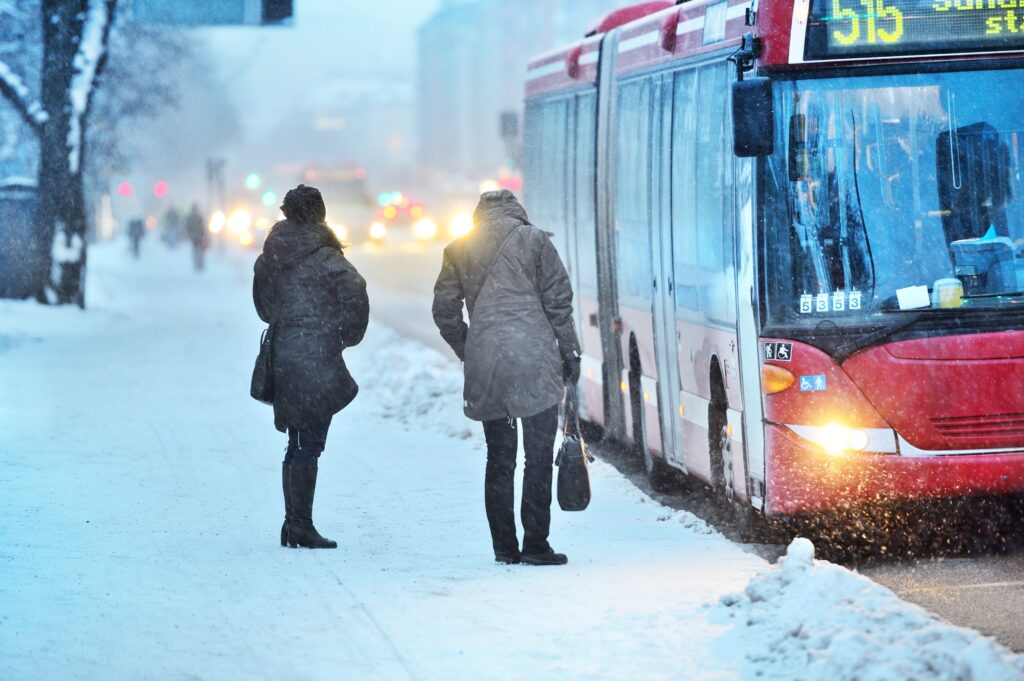
Winter commutes in Chicago mean facing the elements, whether you’re behind the wheel or riding the bus. The Chicago Transit Authority (CTA) offers reliable and safe public transportation and protection from the bitter cold. Still, there are always potential dangers. The combination of slippery surfaces, reduced visibility, and potentially reckless drivers can increase the risk of a Chicago winter bus accident.
In this blog, the Chicago bus accident attorneys at Lerner and Rowe explain the risks of buses in winter weather, how to stay safe when riding the bus, and what to do after a Chicago bus collision.
Bus Risks in Winter
In the winter months, it’s normal to be concerned about using public transportation and the threat of a Chicago winter bus accident. Unfortunately, winter transforms the roads into a treacherous landscape, posing equal dangers to bus passengers, drivers, bicycles, and pedestrians. Taking the bus in winter is safe but there are a few risks of be aware of, such as:
- Decreased visibility: snow, sleet, and foggy conditions can severely limit a bus driver’s view, leading to an increased risk of collisions with pedestrians.
- Poor road conditions: buses can be difficult to control on snow and ice, especially during sudden stops or turns.
- Cancellations: heavy snowfall or other severe weather can lead to delays or cancellations of bus services.
- Crowded conditions: buses may be more crowded than usual during winter as people try to avoid driving in bad weather. This can make it difficult to find a seat and can spread germs.
- Increased stopping: buses may need to stop more frequently in winter due to slower traffic and road conditions, extending your travel time.
- Increased difficulty accessing bus stops: winter weather makes it difficult to walk to and from bus stops, especially for people with mobility limitations.
- Slippery sidewalks and streets: boarding and exiting the bus can be hazardous when the ground is covered in snow or ice.
How to Stay Safe as a Bus Passenger
It is impossible to prevent a Chicago winter bus accident. As a passenger, there are a few things you can do on your ride to keep yourself safe, including:
- Wear proper footwear with good traction, use handrails, and be extra cautious to avoid slip and fall accidents.
- Allow extra time for your trip in case of delays.
- If the bus is crowded, try to find a seat near a window or door so you can get off easily.
- Check the bus schedule and weather forecast before you leave home.
- If you get stuck on the bus in a snowstorm, stay calm.
- Dress warmly and wear waterproof shoes.
- Be aware of your surroundings and watch out for cars and other vehicles.
- When waiting for the bus, use designated shelters or stand away from the curb to stay out of the way of traffic.
- If you notice anything that seems unsafe, such as erratic driving or slippery conditions, politely inform the bus driver.
- Always trust your instincts. If you don’t feel safe, get off at an earlier stop.
- Check CTA updates to check for bus delays, cancellations, and reroutes.
- If possible, have a backup plan in case your bus trip is disrupted.
What to Do After a Chicago Winter Bus Accident as a Passenger
From bus passenger to car driver, pedestrian to cyclist, even scooter rider–the steps you take after a winter bus accident in Chicago will differ. For example, drivers should turn on their hazard lights and move their car to the side of the street when it’s safe to do so. Additionally, pedestrians and bicyclists should move to the sidewalk or a safe location away from traffic.
While general safety steps apply to all, passengers in a Chicago winter bus accident will have specific actions to prioritize, such as:
- Contacting the Chicago Transit Authority (CTA) to report the accident.
- If the bus is in a dangerous location, like on busy traffic lanes, carefully exit and move to a safe area away from traffic.
- Write down the bus route number and well as the time and location of the accident.
- Take photos of the accidents, including your seat on the bus as well as any injuries.
- Even if you feel okay initially, get checked out by a doctor after an accident. Some injuries, like whiplash, may not manifest immediately.
- Maintain receipts for medical bills, lost wages, or any other accident-related costs.
Contact a Chicago Bus Accident Lawyer
While riding the bus any time of year is safe, there is an increased risk for wrecks in the winter months. By following the tips mentioned above, you can stay safe on the bus this winter. If you or a loved one are injured in a Chicago winter bus accident due to the negligence or recklessness of another, Lerner and Rowe can help. We have a proven track record of results and have won billions of dollars for our clients.
For your free case consultation, contact our Chicago personal injury lawyers by dialing 708-222-2222. Our office hours are 8:00 a.m. to 5:00 p.m., Monday-Friday, yet we are happy to take your call 24/7. If you prefer to contact us online, click the LiveChat feature on our website. You can also fill out this Lerner and Rowe Injury Attorneys. Consultations are completely free and we do not charge any fees unless we win your case.



